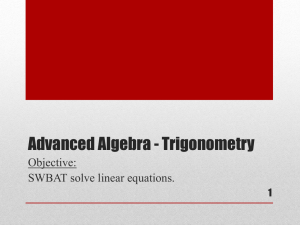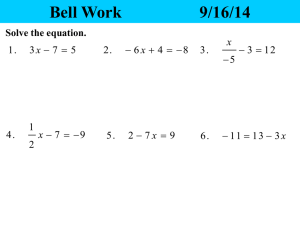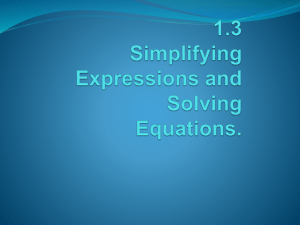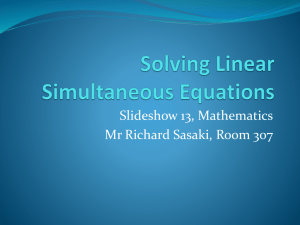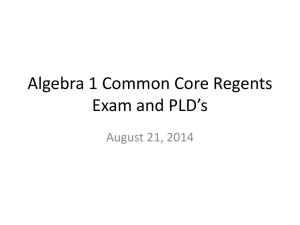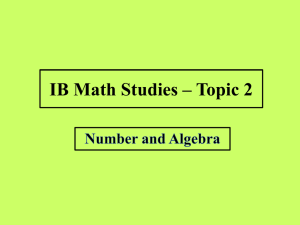Solving Systems in 3 Variables
advertisement
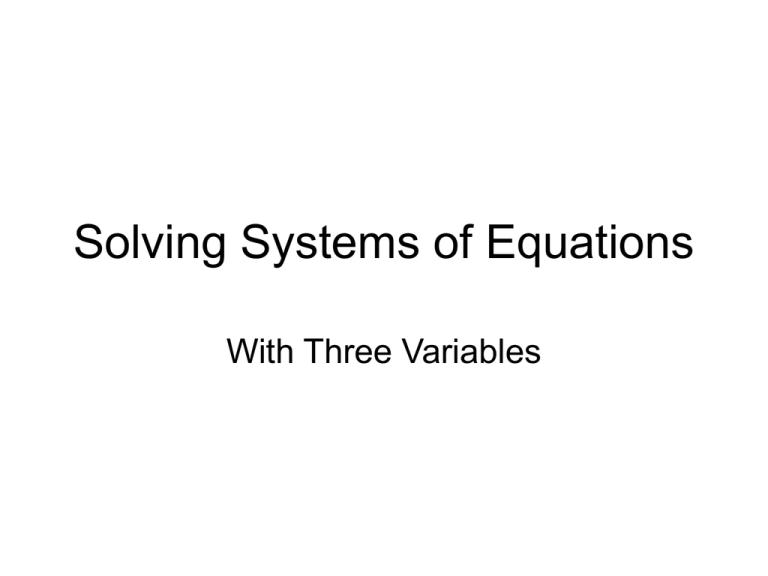
Solving Systems of Equations
With Three Variables
3x + 2y + 4z = 11
2x – y + 3z = 4
5x – 3y + 5z = -1
• Solving systems of equations with three variables takes strong
organizational skills and good attention to detail.
• The elimination or addition method is generally used, although there
are certain equations, particularly when only one or two of the three
variables is present, where substitution will work.
• It may help to follow a very consistent series of steps in selecting
which equations and variables to work with. Early disorganization
can occur because any two of the three equations can be used and
any of the three variables can be eliminated.
A)
B)
C)
3x + 2y + 4z = 11
2x – y + 3z = 4
5x – 3y + 5z = -1
• It may help to label your original three equations. Using a letter
series, such as A, B, and C, is better than using numbers. Using a
different color may also help keep your attention to this detail as well
as keep these letters separate from your variables.
• You’re now going to choose two of these equations to work with, and
one of the variables to eliminate. There are ways to choose
equations and variables based upon the easiest coefficients to
eliminate. But if you need a consistent series of steps, then always
begin with the first two equations (equations A and B, here) and
always eliminate x.
•Rewrite equations A and B below the original problem. Identify the x
value coefficients’ lowest common multiple, make sure they have
opposite signs, and distribute to each equation.
A)
B)
C)
A) 3x + 2y + 4z = 11
B) 2x – y + 3z = 4
3x + 2y + 4z = 11
2x – y + 3z = 4
5x – 3y + 5z = -1
LCM of 3 and 2 is 6, so make 2x a negative
by multiplying A equation by 2 and B by -3.
• To make each of x’s coefficients a 6, with opposite signs, note the
multiplicands and distribute,
A) * 2
B) * -3
2(3x + 2y + 4z = 11)
-3(2x – y + 3z = 4)
• and then add the equations.
6x + 4y + 8z = 22
-6x + 3y – 9z = -12
/
• Label this new equation and box it for later
D)
7y – z = 10
7y – z = 10
•Now do the same for two different equations and the same variable.
For a consistent method, use B and C, eliminating x
A)
B)
C)
B) 2x – y + 3z = 4
C) 5x – 3y + 5z = -1
3x + 2y + 4z = 11
2x – y + 3z = 4
5x – 3y + 5z = -1
LCM of 2 and 5 is 10; so make 5x the negative
by multiplying the B equation by 5 and C by -2
• To make each of x’s coefficients a 10, with opposite signs, note the
multiplicand and distribute,
B) * 5
C) * -2
5(2x – y + 3z = 4)
-2(5x – 3y + 5z = -1)
10x – 5y + 15z = 20
-10x + 6y – 10z = 2
• and add the equations.
/
y + 5z = 22
• We already have a D, so label this new equation E and box it.
E)
y + 5z = 22
•Now copy down the equations you boxed: D and E. Each has only two
variables. Although substitution could be used here, let’s keep with the
elimination/addition process, since many equation pairs remain too difficult to
use substitution.
D)
E)
•
•
Keeping to a consistent method, we now eliminate the y variable. We can
do this with an LCM of 7: multiply E by -7, and leave D alone.
To make the y’s coefficients 7, note each multiplicand and distribute.
D)
E)* -7
7y – z = 10
-7( y + 5z = 18)
Add the equations,
• and simplify.
•
7y – z = 10
y + 5z = 22
Now we know …
7y – 1z = 10
-7y – 35z = -154
/
36 z 144
36
36
z=4
-36z = -144
• Now we work our way back with our solution.
• In equation D or E, solve, using z = 4
(Here, E is easier, but if you need consistent steps, always use D)
E)
y + 5z = 22
y + 5(4) = 22
y + 20 = 22
- 20 -20
y=2
•
In equation A, B, or C, solve, using y = 2 and z = 4
(If you need consistent steps, always use A)
A) 3x + 2y + 4z = 11
3x + 2(2) + 4(4) = 11
3x + 4 + 16 = 11
3x + 20 = 11
- 20 -20
3x = -9
X = -3
The solution is written: {(-3, 2, 4)}
Here’s a complete example. Solve the following system:
A)
x + 2y + z = 4
B)
-2x + y + 3z = -8
C)
3x + 4y – 2z = 9
A) *2
2(x + 2y + z = 4)
B) (unchanged)
D)
2x + 4y + 2z = 8
-2x + 1y + 3z = -8
5y + 5z = 0
___________________________________________________________________________
B) *3
C) *2
3(-2x + y + 3z = -8)
2(3x + 4y – 2z = 9)
E)
-6x + 3y + 9z = -24
6x + 8y – 4z = 18
11y + 5z = -6
____________________________________________________________________________
D) *11
E) *-5
11(5y + 5z = 0)
-5(11y + 5z = -6)
55y + 55z = 0
-55y – 25z = 30
30z = 30
z=1
____________________________________________________________________________
D) 5y + 5(1) = 0
5y + 5 = 0
5y = -5
y = -1
____________________________________________________________________________
A) x + 2(-1) + 1 = 4
x–2+1=4
x–1=4 x=5
{(5, -1, 1)}
If you need consistent steps:
1.
Label the three original equations: A, B, and C
2.
Write equations A and B. Determine the LCM of the coefficients of
the x variable, opposites signs, and distribute the multiplicand to
each. Add the equations, which will eliminate the x variable.
• Label this new equation: D
3.
Write equations B and C. Determine the LCM of the coefficients
of the x variable, opposite signs, and distribute the multiplicand to
each. Add the equations, which will eliminate the x variable.
• Label this new equation: E
4.
Write these new equations D and E. Determine the LCM of the
coefficients of the y variable, opposite signs, and distribute the
multiplicand to each. Add the equations, which will eliminate the y
variable. You can now solve for z.
5.
Put this z value into equation D and solve for y.
6.
Put these y and z values into equation A and solve for x.
7.
List your solutions as: {(x, y, z)}
